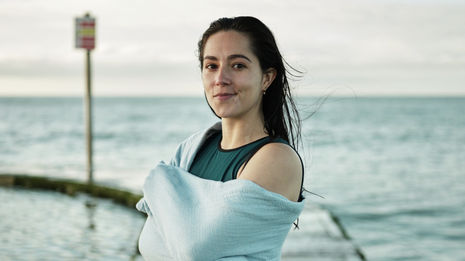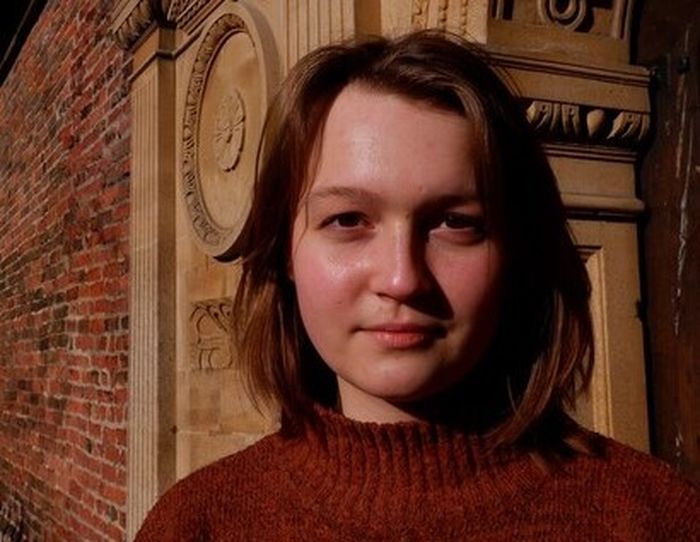‘There’s a natural intimacy there, and it has been beautiful’: Freya Bromley
The author of The Tidal Year talks grief, wild swimming and learning to take herself seriously

“People meet me and there’s a sense that we know each other already because they have often spent quite a lot of time with me. There’s a natural intimacy there, and it has been beautiful.”
Freya Bromley is currently touring her debut memoir, The Tidal Year, which was published this May. We spoke through a screen during our interview, but that feeling of knowing the people she meets through her book remained.
“They’ll just start with describing somebody they’ve lost in their life. Often you meet people, it’s like, Hi, how are you? What’s your name? What’s your job? and that kind of bullshit on the surface. The book has been a way to totally cut through to what really resonates with people, and that has been an amazing gift.”
The Tidal Year is captured by its subtitle, a memoir of ‘grief, swimming, and sisterhood’ which appeared following the loss of Bromley’s brother. Yet this is very much Bromley’s story – she firmly maintains: “it’s not my job to write a book about him. I don’t have that right, I’m not him, that’s his story. All I kind of was trying to write about was about what it was like to move forward with grief.”
“It’s not my job to write a book about him. I don’t have that right”
Bromley’s memoir does much to tackle grief beyond its murky surface. As the title suggests, the story is bound by her love of wild swimming in Britain’s 36 tidal pools. Nature is one of her foremost inspirations, and she allows it to encircle her narrative. “Grief is so hard to comprehend”, she tells me. “Sometimes being in nature and there being a gorgeous sunset and amazing sky is like the only thing that feels as big and as powerful as the feeling of grief inside.”
I was struck by her experiences of swimming in Cambridge – both Grantchester Meadows and Jesus Green Lido get a shout-out. The former features in a chapter where she describes her participation in the part-time MSt in Creative Writing. The cohort, she explains, was diverse, with a multitude of backgrounds and ideas. “But we all had one thing in common: we wanted to be able to call ourselves writers.”
Her experience was not without frustrations, but Cambridge allowed Bromley to solidify her identity and confidence through learning and community. “We all had this shared intention of wanting to […] turn something that felt like a secret inside us into being a huge part of our identity. That was really powerful to be around. It was almost like we were co-signing each other’s dreams.”
Bromley first made waves with her swimming themed podcast of the same name, which caught the attention of a literary agent. “I feel like a lot of us expect that it’s over before it’s even started”, she expresses, in relation to her early success. Though Bromley managed to publish The Tidal Year through traditional means, she also urges for “a revolution in sharing people’s stories, regardless of who’s publishing them. I think that’s what’s happening with Unbound, which is like crowdfunding for books.”
“It was almost like we were co-signing each other’s dreams”
For Bromley, the goalposts for success are constantly moving. “There was a time where the thought of having an agent was the best thing in the world. And as soon as I got an agent, I was like, I’ll be so happy when I get a book deal. Now I’ve had a book deal, I move on to the next thing.” Identity has been something that Bromley has realised is internal, and not earned. “I didn’t feel like I would have a right to call myself a writer if I didn’t have the book, whereas now I know that I’m a writer, inside me.”
These twinned yet opposing feelings of ambition and insecurity come from Bromley’s experience of womanhood, an important theme of The Tidal Year. “As a young woman, I was so hungry for people to take me seriously. My relationships with quite creatively successful men would become tangled up with that kind of validation. I thought they were my type, but then realised that they were what I wanted to be. Eventually you have to realise: how is anyone else going to take you seriously if you don’t take yourself seriously?”
Writing a memoir implied a large degree of vulnerability for Bromley, who “worried a lot when I was writing it that I came across like a really moany bitch. [...] But now, I wish I’d had the confidence to go further with some of the ugly thoughts and feelings I had. Why do we [women] have to be likeable?” For Bromley then, being a writer and being successful are tied to externalising feelings that she describes are “tangled.” Though she still struggles with validation, confessing it to be “addictive”, her understanding of what it means to “do well” and more importantly, what doing well means to her, is shifting.
“There’s something to be said for trying to always find joy in the writing process, because I find with me it’s never really enough – but that’s more of a me issue. Maybe that’ll be what my next book is about!”
 Features / Should I stay or should I go? Cambridge students and alumni reflect on how their memories stay with them15 December 2025
Features / Should I stay or should I go? Cambridge students and alumni reflect on how their memories stay with them15 December 2025 News / Cambridge study finds students learn better with notes than AI13 December 2025
News / Cambridge study finds students learn better with notes than AI13 December 2025 Comment / The magic of an eight-week term15 December 2025
Comment / The magic of an eight-week term15 December 2025 News / News In Brief: Michaelmas marriages, monogamous mammals, and messaging manipulation15 December 2025
News / News In Brief: Michaelmas marriages, monogamous mammals, and messaging manipulation15 December 2025 News / Uni Scout and Guide Club affirms trans inclusion 12 December 2025
News / Uni Scout and Guide Club affirms trans inclusion 12 December 2025











